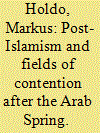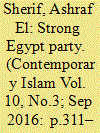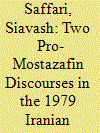| Srl | Item |
| 1 |
ID:
152448


|
|
|
|
|
| Summary/Abstract |
The third-term policies of the AKP (Justice and Development Party) in Turkey posed new challenges for observers: do top-down Islamization policies and the increasing pan-Islamist tone in Turkish foreign policy signify a return to Islamism or is a new amalgamation in the making? In this case, is ‘post-Islamism’ now dated as an analytical tool to characterize the AKP’s new ideological formation or was it always a misnomer? Drawing on el-Affendi’s (2008) distinction between the Medina and Damascus models and observing the new Islamic opposition to the AKP policies, its post-2011 ideological configuration will be analyzed with reference to an antinomy of Islamism vs. Muslimism. Muslimism, an extension of Damascus model, is a quest for power and seeks Muslim interests worldwide. Islamism, an heir to Medina model, may be characterized by an ethical pursuit of justice that occasionally clashes with Muslim political interests.
|
|
|
|
|
|
|
|
|
|
|
|
|
|
|
|
| 2 |
ID:
153141


|
|
|
|
|
| Summary/Abstract |
In the aftermath of the Arab Spring, conflicts in Egypt and Tunisia over the authority to rule and the role of religion in society raised questions about these societies’ capacity for reconciling differences. In retrospect, the conflicts also raise questions about the theoretical tools used to analyse regional developments. In particular, the ‘post-Islamism’ thesis has significantly changed the debates on ‘Islam and democracy’ by bringing to light the changing opportunity structures, and changed goals, of Islamist movements. However, this paper argues that the theory underestimates differences within post-Islamist societies. Drawing on field theory, the paper shows how the actual content of post-Islamism is contingent on political struggle. It focuses on three fields whose political roles have been underestimated or misrepresented by post-Islamist theorists: Islamic feminism, Salafist-jihadism and the revolutionary youth. Their respective forms of capital – sources of legitimacy and social recognition – give important clues for understanding the stakes of the conflicts after the Arab Spring.
|
|
|
|
|
|
|
|
|
|
|
|
|
|
|
|
| 3 |
ID:
148226


|
|
|
|
|
| Summary/Abstract |
Islamist parties espouse a socio-political platform that rests on the notion of creating an Islamic order and the application of the Islamic Sharia as a normative/legal and authoritative power structure. Progressive/Democratic Islamists is a term coined by some scholars to account for the emergence of new actors within the Islamic ranks starting from the 1990s in several Middle Eastern countries including Iran, Turkey, Egypt and North African countries. These actors depart from authoritarian political interpretations of Islamic texts, calling for a rationalist interpretation of Islamic idioms emphasizing the compatibility of Islam with democracy, pluralism, human rights and grassroots empowerment. This article analyzes the case of the Strong Egypt party (SEP) in the wake of the 2011 uprising in Egypt. It problematizes the identity of the party and its location in the ideological and political spectrum in Egypt. The article argues that the SEP claims a mixture of cultural conservatism, economic progressivism and political democracy, but that this mixture suffers from lack of depth, sophistication and a genuine social constituency and project.
|
|
|
|
|
|
|
|
|
|
|
|
|
|
|
|
| 4 |
ID:
154693


|
|
|
|
|
| Summary/Abstract |
A number of studies have examined the role of the economically marginalized classes in the 1979 Iranian Revolution and the events which transpired in its immediate aftermath. It has been suggested that the mass mobilization of these classes, often referred to collectively as the mostazafin (downtrodden) in the official literature of the Islamic Republic, was instrumental in the success of the revolution and the subsequent establishment of the Islamic Republic under the leadership of Ruhollah Khomeini. The present paper contrasts Shi’i liberation theology and Shi’i Islamism as two distinct pro-mostazafin discourses that emerged in mid- and late-twentieth century Iran, and which facilitated the participation of the lower- and under-classes in the revolutionary movement. It argues that while it was developed originally by Shi’i liberation theologians, Islamist forces were able to successfully appropriate the pro-mostazafin discourse and gain the support of the economically marginalized classes in the crucial final phase of the revolution, and in doing so create an important social base for their political power.
|
|
|
|
|
|
|
|
|
|
|
|
|
|
|
|